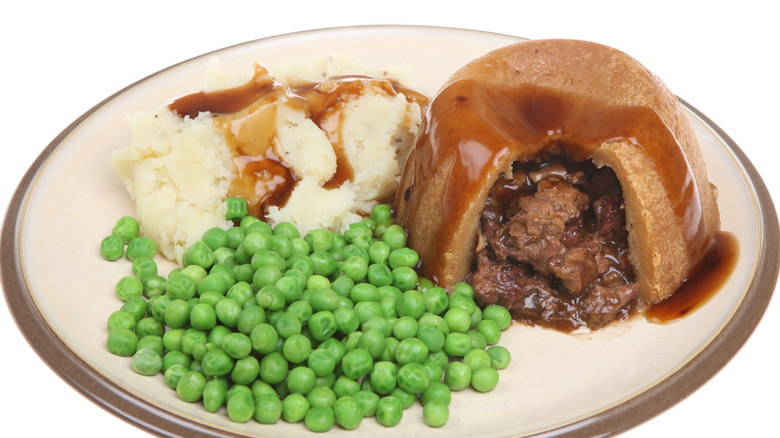The Historic Origin Of Steak And Kidney Pudding
An intricate and classic food in British cuisine, steak and kidney pudding is no new trend. This delicacy, as you might expect, calls for a kidney — often used from veal (per The Guardian), lamb, or pig — finely chopped steak, onion, and sometimes mushrooms and/or carrots, depending on personal preference.
It is encased in a soft pastry made from suet, which is typically derived from the fat encasing cow or mutton kidneys, according to The Spruce Eats. This lengthy process includes removing the fat from around the kidney and adding it to boiling water. The remaining fat separates from the water once cooled, thus producing the essential ingredient for the pudding, which adds a uniquely rich flavor.
The pudding is steamed for one to two hours, then topped with a stout- or ale-infused brown gravy and often served with mashed potatoes, according to Grandad's Cookbook, making for a delightfully warm and cozy meal for cold winter evenings.
Not only is this traditional dish rich with flavor, but with history as well.
The original steak and kidney pudding recipe came from a journalist
Born in 1836, Isabella Beeton, who eventually became known to her audience as Mrs. Beeton, was a prolific writer and journalist. Initially, Beeton wrote a series of articles with tips to properly manage a Victorian home that were published in The English Woman's Domestic Magazine, according to Victorian Era. The articles were so successful that they were turned into a volume in 1861 entitled "Mrs. Beeton's Book of Household Management," per National Portrait Gallery.
The first written account of the steak and kidney pudding recipe was included in this volume which, according to The Guardian, was sent to Beeton from a reader in Sussex. The original recipe called for 2 pounds of steak as well as 2 kidneys, though from which animal was not specified. It required salt and pepper and the suet crust (which required additional milk), and was set to cook for 4 hours, according to The Foods of England Project.

